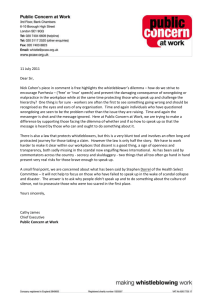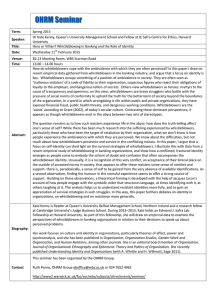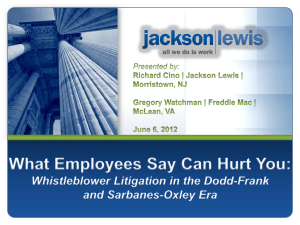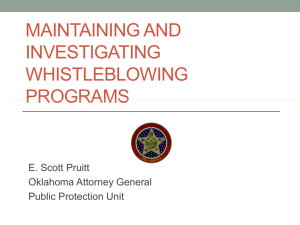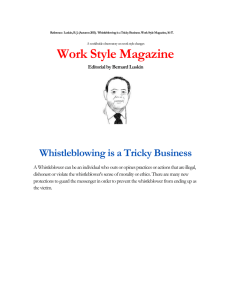Press Release: Silence in the City?
advertisement
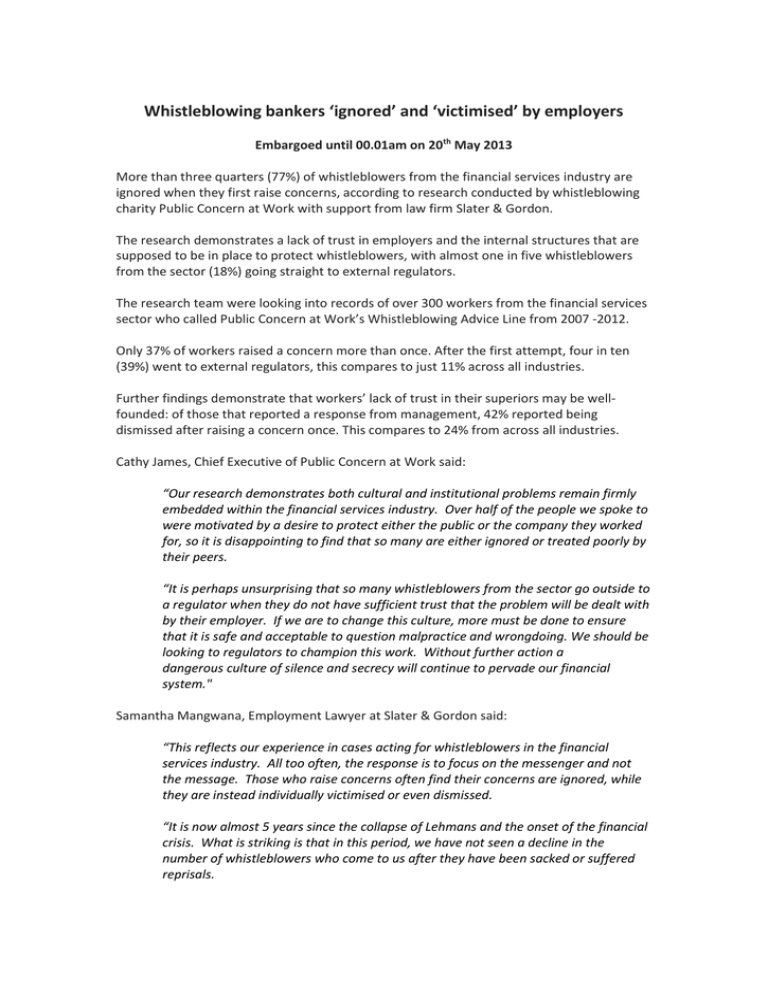
Whistleblowing bankers ‘ignored’ and ‘victimised’ by employers Embargoed until 00.01am on 20th May 2013 More than three quarters (77%) of whistleblowers from the financial services industry are ignored when they first raise concerns, according to research conducted by whistleblowing charity Public Concern at Work with support from law firm Slater & Gordon. The research demonstrates a lack of trust in employers and the internal structures that are supposed to be in place to protect whistleblowers, with almost one in five whistleblowers from the sector (18%) going straight to external regulators. The research team were looking into records of over 300 workers from the financial services sector who called Public Concern at Work’s Whistleblowing Advice Line from 2007 -2012. Only 37% of workers raised a concern more than once. After the first attempt, four in ten (39%) went to external regulators, this compares to just 11% across all industries. Further findings demonstrate that workers’ lack of trust in their superiors may be wellfounded: of those that reported a response from management, 42% reported being dismissed after raising a concern once. This compares to 24% from across all industries. Cathy James, Chief Executive of Public Concern at Work said: “Our research demonstrates both cultural and institutional problems remain firmly embedded within the financial services industry. Over half of the people we spoke to were motivated by a desire to protect either the public or the company they worked for, so it is disappointing to find that so many are either ignored or treated poorly by their peers. “It is perhaps unsurprising that so many whistleblowers from the sector go outside to a regulator when they do not have sufficient trust that the problem will be dealt with by their employer. If we are to change this culture, more must be done to ensure that it is safe and acceptable to question malpractice and wrongdoing. We should be looking to regulators to champion this work. Without further action a dangerous culture of silence and secrecy will continue to pervade our financial system." Samantha Mangwana, Employment Lawyer at Slater & Gordon said: “This reflects our experience in cases acting for whistleblowers in the financial services industry. All too often, the response is to focus on the messenger and not the message. Those who raise concerns often find their concerns are ignored, while they are instead individually victimised or even dismissed. “It is now almost 5 years since the collapse of Lehmans and the onset of the financial crisis. What is striking is that in this period, we have not seen a decline in the number of whistleblowers who come to us after they have been sacked or suffered reprisals. “For whistleblowers in this unfortunate position, the law is on their side, and their rights can be very strong. But litigation is only ever a last resort. “To avoid future scandals that threaten economic stability, whistleblowers’ concerns need to be heard, and those responsible should take action to prevent wrongdoing and malpractice. More must be done to foster a culture where whistleblowers can raise concerns safely, and without fear for their careers.” Key findings Throughout this report, findings compared to “all sectors” are drawn from our report Whistleblowing: the inside story – a study of the experiences of 1,000 whistleblowers. Organisation type The types of organisation were: banks (with retail arm) (48%), investment banks (9%), Independent Financial Advisers (7%), asset management firms (6%), insurance companies (5%), accountancy firms (5%), brokerages (4%) and finance companies (4%) We also had low numbers of cases from rating agencies, regulators, mortgage brokers, building societies and debt recovery agencies. Type of concern The top six concerns were: fraudulent or criminal activity (17%), mis-selling (14%), breach of company policy (such as recruitment procedures or code of conduct) (14%), breach of legal or regulatory obligations (13%), incorrect reporting to the employer or stakeholders (6%) and incorrect reporting to a client or third party (5%). We also had calls about market abuse, insider training, money laundering and tax fraud. About the wrongdoing Half of all cases involved wrongdoing that harmed the public (49%). In 76% of cases the wrongdoing was recurring. In nearly half of the cases (47%) the wrongdoing had been occurring for less than six months. Nearly all callers stated that there were other witnesses (99%). However overall 84% of workers said they raised a concern alone. Job Role 22% of callers were management level: including team leader, assistant manager, line manager or senior management positions. 16% described themselves as holding an executive, director or partner position. 11% were financial advisors or consultants. 10% were accountants or auditors. 7% were analysts. 7% were compliance, fraud or risk specialists. Professional standing 58% of workers had professional standing (such as accountant or lawyer). Employment status 69% of callers were seeking advice about a current employer. Length of service 37% of callers had been in the company for less than two years. Motivation 22% of callers raised or intended to raise their concern for personal motives (e.g. to support an employment tribunal claim, to support a grievance or because of a personal dislike of an individual). 6% were motivated by worries over their own liability and 10% by a professional duty to raise the concern. 55% of callers were motivated either by a desire to protect the public (34%) or by a desire to protect the company they work for (21%). Barriers to raising concerns We were able to glean limited information on the above but noted the following: On 26 occasions whistleblowers reported that an adverse effect on their career prevented them from raising a concern for the first time. On 19 occasions whistleblowers reported a ‘gagging clause’ or non-disparagement clause in a compromise agreement prevented them from raising a concern. 12 individuals said an existing employment dispute or personal issues prevented them from raising a concern. How many times does a whistleblower raise a concern? 62% of workers raised a concern at least once. This is higher than findings from Whistleblowing: the inside story, (44%). However, those in financial services were less likely to raise a concern a second time (20%), which is much lower than our findings on all sectors (39%) from Whistleblowing: the inside story. Formal power of wrongdoer Though 38% of callers were either at management or executive level, 86% of wrongdoers were seen as more powerful than the whistleblower. Where a concern was raised Where a concern was raised for the first time the recipient was within the organisation 66% of the time. We included line managers, senior managers, executive/directors; compliance/risk/legal functions and internal reporting line/nominated officer within the definition of within the organisation. Within this figure line managers were the most popular recipient (27%). Raising a concern with senior management was the least preferred route at all stages of raising a concern. From our findings in Whistleblowing: the inside story this is the most preferred route the second time a concern is raised across all sectors (33%). If the concern was raised a second time then the use of internal arrangements nearly halved, making up 35% of the recipients of concerns. This figure is 57% across all sectors. Specialist functions such as compliance had slightly higher usage (10%) than whistleblowing hotlines (8%) (designed to provide alternative to line management or to be a place to raise concerns should the issue not be dealt with) the first time an individual raised a concern. Usage of hotlines decreased throughout the process of raising a concern, indicating that if the whistleblower did not received a positive response from line management they were unlikely to trust these channels either. 18% of individuals approached a regulator the first time they raised a concern, increasing to 39% the second time a concern was raised. This figure is 4% and 11% respectively, across all sectors. A concern was raised with a regulator 143 times. Of these 73% were raised with the Financial Services Authority (now the Financial Conduct Authority). Disclosures to other regulators were spread across the following: the Financial Reporting Council, HMRC, Information Commissioner’s Office, Office of Fair Trading, Serious Fraud Office, and the Securities and Exchange Commission. Response to the concern A sizeable majority of callers said that nothing had been done to address their concern: 77% said this after raising their concern for the first time; this figure falls slightly to 71% after the concern is raised for a second time and is 53% when the concern was raised for a third or fourth time. Treatment of whistleblowers In 60% of cases whistleblowers reported no response from management, either negative or positive. From the remaining 40% (112 cases): o 42% of whistleblowers were dismissed after raising their concern for the first time. This is markedly different to previous research, where 24% of whistleblowers reported being dismissed on raising a concern for the first time. 48% of workers in financial services reported that they were dismissed on the second attempt to raise a concern, compared to 29% from all sectors. o 21% are formally disciplined, rising to 28% the second time a concern is raised. Out of 112 cases, there were only 11 instances where organisations were described as supportive, by the whistleblower. ENDS For further information, please contact Public Concern at Work’s Press Office on 020 3117 2520 or Slater & Gordon’s Press Office on 07943 962 640 Notes to Editors: Public Concern at Work Public Concern at Work, the whistleblowing charity, aims to protect society by encouraging workplace whistleblowing. We operate a free, confidential advice line for workers with whistleblowing dilemmas, support organisation in establishing effective arrangements for staff to speak up, inform public policy and campaign for legislative reform. Please see our website for further details www.pcaw.org.uk Slater & Gordon (formerly Russell Jones & Walker) is a law firm with over 90 years’ experience, 10 offices nationwide and over 400 employees. Our goal is to deliver exceptional, affordable legal services for individuals, membership organisations and affinity groups, in their personal, employment and business affairs. Our reputation is built on the range of expertise offered by our team of experts and on the scope of their practical experience in providing expert representation to its clients.
